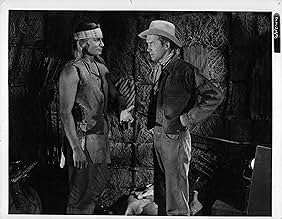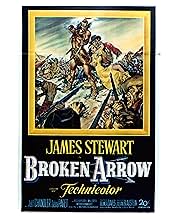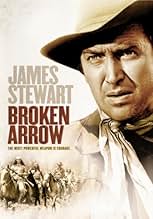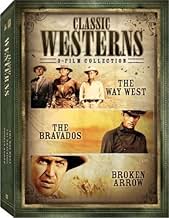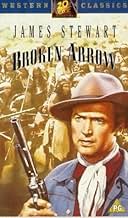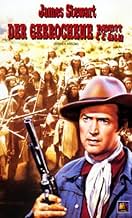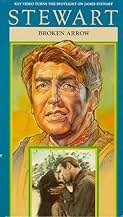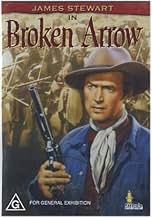IMDb-BEWERTUNG
7,1/10
10.322
IHRE BEWERTUNG
Tom Jeffords versucht, Frieden zwischen Siedlern und Apachen zu stiften.Tom Jeffords versucht, Frieden zwischen Siedlern und Apachen zu stiften.Tom Jeffords versucht, Frieden zwischen Siedlern und Apachen zu stiften.
- Regie
- Drehbuch
- Hauptbesetzung
- Für 3 Oscars nominiert
- 4 Gewinne & 6 Nominierungen insgesamt
Joyce Mackenzie
- Terry
- (as Joyce MacKenzie)
Robert Adler
- Lonergan - Stage Driver
- (Nicht genannt)
Trevor Bardette
- Stage Passenger
- (Nicht genannt)
Chris Willow Bird
- Nochalo
- (Nicht genannt)
Raymond Bramley
- Col. Bernall
- (Nicht genannt)
Chet Brandenburg
- Miner
- (Nicht genannt)
Argentina Brunetti
- Nalikadeya - Cochise's Wife
- (Nicht genannt)
Harry Carter
- Miner
- (Nicht genannt)
Iron Eyes Cody
- Teese
- (Nicht genannt)
J.W. Cody
- Pionsenay - Chosen Warrior
- (Nicht genannt)
Heinie Conklin
- Townsman
- (Nicht genannt)
Dolores Christine Cypert
- American Indian
- (Nicht genannt)
- …
Empfohlene Bewertungen
As the war rages between the American settlers and the Apache, former soldier Tom Jeffords happens upon a young Indian wounded after an attack. Taking upon himself to aid the boy, it's not long before the Apache show up intent on killing Jeffords by way of the war instincts. Pleading for Jeffords' life, the boy manages to get him spared by the Apache chief, Cochise. It's the start of a friendship that may just bring and end to the war and peace across the west.
Tho not the first "social" Western film made, Broken Arrow, it can be argued, is maybe one of the most important and telling genre films of the 50s. Showing humanist portrayals of the Apache and dealing out level headed tellings of the relationships between whites and the Native Americans, Delmer Daves' film is as relevant today as it was back on release. Adapted from Elliott Arnold's novel Blood Brother, the story follows Jeffords (a measured and fine James Stewart) as he attempts to broker peace between the warring factions. Firstly by convincing Cochise (Jeff Chandler bang on form) to allow the mail run thru the pass, something that brings suspicion and calls of Indian lover from Jeffords' own kind, and then to finally set up a peace pact at a time when violence and hatred was rife in the west.
As the friendship between the two men grows, Jeffords and an Apache girl fall in love (beautiful Debra Paget as Sonseeahray), thus giving the story a further jolt of momentum. The screenplay then really hits its stride, as Daves and his crew pit peace and inter racial love against a backdrop of bloodshed and savagery. Never glossing over just how hard peace is going to be, Broken Arrow retains intelligence and a sensitivity even as breakaway factions from both sides (for example we see Geronimo split the Apache and form a renegade front) are intent on killing off the peace process. It even has time for deep emotional kickers to reinforce the point of just how tough and unlikely peace and tolerance can be sometimes.
Broken Arrow was, and still is, a bold picture. In fact it can be argued that for the likes of Daves and Stewart, it was at the time very bold and risky career moves. But it paid off because the film stands up today as a picture of some distinction. It's themes and approach to its subjects are something that this generation, and all the future ones, will always find to be socially important. Boosted by Hugo Friedhofer's luscious score and taking advantage of the Lone Pine location shoot, Broken Arrow is a fine fine film that even non Western fans should be looking to absorb. 8/10
Tho not the first "social" Western film made, Broken Arrow, it can be argued, is maybe one of the most important and telling genre films of the 50s. Showing humanist portrayals of the Apache and dealing out level headed tellings of the relationships between whites and the Native Americans, Delmer Daves' film is as relevant today as it was back on release. Adapted from Elliott Arnold's novel Blood Brother, the story follows Jeffords (a measured and fine James Stewart) as he attempts to broker peace between the warring factions. Firstly by convincing Cochise (Jeff Chandler bang on form) to allow the mail run thru the pass, something that brings suspicion and calls of Indian lover from Jeffords' own kind, and then to finally set up a peace pact at a time when violence and hatred was rife in the west.
As the friendship between the two men grows, Jeffords and an Apache girl fall in love (beautiful Debra Paget as Sonseeahray), thus giving the story a further jolt of momentum. The screenplay then really hits its stride, as Daves and his crew pit peace and inter racial love against a backdrop of bloodshed and savagery. Never glossing over just how hard peace is going to be, Broken Arrow retains intelligence and a sensitivity even as breakaway factions from both sides (for example we see Geronimo split the Apache and form a renegade front) are intent on killing off the peace process. It even has time for deep emotional kickers to reinforce the point of just how tough and unlikely peace and tolerance can be sometimes.
Broken Arrow was, and still is, a bold picture. In fact it can be argued that for the likes of Daves and Stewart, it was at the time very bold and risky career moves. But it paid off because the film stands up today as a picture of some distinction. It's themes and approach to its subjects are something that this generation, and all the future ones, will always find to be socially important. Boosted by Hugo Friedhofer's luscious score and taking advantage of the Lone Pine location shoot, Broken Arrow is a fine fine film that even non Western fans should be looking to absorb. 8/10
Although the story is entertaining and the performances of James Stewart, Jeff Chandler and Debra Paget outstanding, what makes Broken Arrow a landmark film is its portrayal of the Apache Indians as something more than savage killers. Indians in the movies were always seen as brutal and inhuman. Here they are seen as people who want what the "white men" wanted: to live in freedom with their families on their own land and to live their lives in their own way.
Jeff Chandler is terrific as Apache leader Cochise, who he would play twice more in other films. There is a moving scene when they return from battle and he recites the names of those killed with a pained look in his eyes. Cochise and Stewart's character have a relationship which grows from mutual respect to a true friendship as they try to work out peace between the whites and indians. Stewart is looked on as a traitor by his friends and things are complicated further by his relationship with the young Apache girl played by Debra Paget.
I cannot think of another western in which indians have been portrayed as real people with emotions who hurt, who love. When this film was released 50 years ago, blacks, asians and American Indians were still being portrayed using the worst kinds of racial stereotypes.
Jeff Chandler is terrific as Apache leader Cochise, who he would play twice more in other films. There is a moving scene when they return from battle and he recites the names of those killed with a pained look in his eyes. Cochise and Stewart's character have a relationship which grows from mutual respect to a true friendship as they try to work out peace between the whites and indians. Stewart is looked on as a traitor by his friends and things are complicated further by his relationship with the young Apache girl played by Debra Paget.
I cannot think of another western in which indians have been portrayed as real people with emotions who hurt, who love. When this film was released 50 years ago, blacks, asians and American Indians were still being portrayed using the worst kinds of racial stereotypes.
Tagline: Of this motion picture the screen can be proud... Today... Tomorrow... A generation from now...
Worth repeating this tagline, because after seeing the film again for the first time in 42 years, it's right on. 50s westerns almost universally depicted Indians as pigeon-English speaking savages... or tried to talk Indian that translated to pigeon-Indian.
While the leading cast is all-Anglo, the perspective is that both sides in the Wild West were had more than a few intelligent, caring individuals among them. A willingness to sacrifice much (including renegades) to achieve a lasting peace is the message.
Jimmy Stewart had something to lose by doing a picture like this, but the acting here stands with any in his career. The portrayal of Cochise by Jeff Chandler is powerful, although unquestionably a little bit too noble-savagish.
"Let's mosey on over there" is a line spoken by Stewart toward the end of the film. Takes you back to a time when people took time to mosey.
A good-hearted picture by a little-known director standing up against the prevailing stereotypes. Wouldn't be surprised if Costner watched it more than once before making "Dances with Wolves".
Worth repeating this tagline, because after seeing the film again for the first time in 42 years, it's right on. 50s westerns almost universally depicted Indians as pigeon-English speaking savages... or tried to talk Indian that translated to pigeon-Indian.
While the leading cast is all-Anglo, the perspective is that both sides in the Wild West were had more than a few intelligent, caring individuals among them. A willingness to sacrifice much (including renegades) to achieve a lasting peace is the message.
Jimmy Stewart had something to lose by doing a picture like this, but the acting here stands with any in his career. The portrayal of Cochise by Jeff Chandler is powerful, although unquestionably a little bit too noble-savagish.
"Let's mosey on over there" is a line spoken by Stewart toward the end of the film. Takes you back to a time when people took time to mosey.
A good-hearted picture by a little-known director standing up against the prevailing stereotypes. Wouldn't be surprised if Costner watched it more than once before making "Dances with Wolves".
While I have seen better westerns, I was really impressed with Broken Arrow. Not just because it is a very good film, but it is also different. While a lot of westerns deal with themes(some complex, some not so much)such as revenge and betrayal, Broken Arrow is a very poetic and elegiac film that you can see perfectly in how the story is constructed. Also the Indians here are portrayed as those in want of freedom with their families, which I found refreshing, seeing as I have seen them portrayed as quite brutal. Broken Arrow is a beautifully photographed film, the script flows nicely and is thought-provoking and the score is very stirring. The acting is fine, Debra Paget, breathtakingly-beautiful she is, and her scenes with Stewart are touching, is good but I couldn't help thinking they could have cast someone older. James Stewart is very believable in one of his better western performances, while Jeff Chandler gives the best performance of his career here and also the best performance of the movie too. All in all, excellent and very moving film. 8/10 Bethany Cox
Delmer Daves offers an important major role to an Indian character, treating him with quality and esteem as human being...
Stewart plays a scout who seeks to heal the divisions between the Apaches and white men But while "Broken Arrow" is a perfectly acceptable depiction of frontier struggles, it does not display Stewart to the best advantages Delmer Daves was competent enough, but he lacked the ultimate virility and intensity of Anthony Mann
"Broken Arrow" examines, rather intensely and directly, the mistreatment and flagrant exploitation of the Indians by whites in the early West
The strength of this often lyrically photographed picture which will a1ways have an honorable place among Westerns lies particularly in the touching dignity of Stewart's love and marriage to an Indian girl (Debra Paget). Indian haters, of course, stir up the usual sort of trouble and Stewart's bride becomes a victim with all the consequent poignancy for which the film is best remembered
The over-wise Chandler counsels him that he must learn to live with his whiteness just as his new friends must contend with their own place in the cosmic scheme of things Cochise has words of stark consolation for Stewart: "As I bear the murder of my people, so you will bear the murder of your wife."
The most interesting aspect of " Broken Arrow" is not the interracial romance between Stewart and Paget, but Stewart's relationship with Chandler's Cochise There is intra-character complexity here, as Chandler struggles to overcome his disturb of all whites, and Stewart attempts to comprehend the different philosophy and cultural of the Indians
Jeff Chandler was quite apt and professional He was so believable in the role of the Apache chief Cochise that he was to essay it again in George Sherman's "The Battle at Apache Pass" in 1952 Chandler's facial bone structure lent itself to noble, incisive Indian profiles, and unlike other Caucasian actors he did not look out of place He was even nominated for Best Supporting Actor at that year's Oscars
Stewart plays a scout who seeks to heal the divisions between the Apaches and white men But while "Broken Arrow" is a perfectly acceptable depiction of frontier struggles, it does not display Stewart to the best advantages Delmer Daves was competent enough, but he lacked the ultimate virility and intensity of Anthony Mann
"Broken Arrow" examines, rather intensely and directly, the mistreatment and flagrant exploitation of the Indians by whites in the early West
The strength of this often lyrically photographed picture which will a1ways have an honorable place among Westerns lies particularly in the touching dignity of Stewart's love and marriage to an Indian girl (Debra Paget). Indian haters, of course, stir up the usual sort of trouble and Stewart's bride becomes a victim with all the consequent poignancy for which the film is best remembered
The over-wise Chandler counsels him that he must learn to live with his whiteness just as his new friends must contend with their own place in the cosmic scheme of things Cochise has words of stark consolation for Stewart: "As I bear the murder of my people, so you will bear the murder of your wife."
The most interesting aspect of " Broken Arrow" is not the interracial romance between Stewart and Paget, but Stewart's relationship with Chandler's Cochise There is intra-character complexity here, as Chandler struggles to overcome his disturb of all whites, and Stewart attempts to comprehend the different philosophy and cultural of the Indians
Jeff Chandler was quite apt and professional He was so believable in the role of the Apache chief Cochise that he was to essay it again in George Sherman's "The Battle at Apache Pass" in 1952 Chandler's facial bone structure lent itself to noble, incisive Indian profiles, and unlike other Caucasian actors he did not look out of place He was even nominated for Best Supporting Actor at that year's Oscars
Wusstest du schon
- WissenswertesAt 41, James Stewart was 26 years older than Debra Paget, who was still only 15 when filming began in early June 1949.
- PatzerWhen General Howard is beginning to pick himself off the ground after the Apache attack on the military wagon train, the first shot shows the ground to be mostly desert sand, with very little vegetation, but when the scene jumps to a long shot of the General getting up, the ground around him is almost entirely covered with green vegetation, showing scarcely any sand at all.
- VerbindungenFeatured in Family Classics: Family Classics: Broken Arrow (1963)
Top-Auswahl
Melde dich zum Bewerten an und greife auf die Watchlist für personalisierte Empfehlungen zu.
- How long is Broken Arrow?Powered by Alexa
Details
Box Office
- Weltweiter Bruttoertrag
- 10.145 $
- Laufzeit1 Stunde 33 Minuten
- Seitenverhältnis
- 1.37 : 1
Zu dieser Seite beitragen
Bearbeitung vorschlagen oder fehlenden Inhalt hinzufügen



